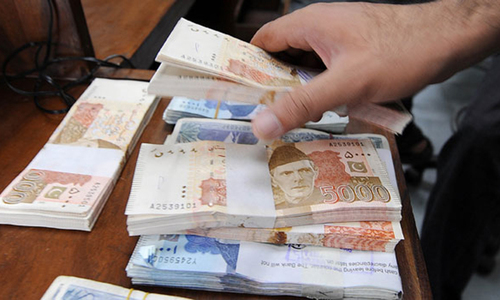ISLAMABAD: Pakistan faced harsh questioning on effectiveness of its efforts against money laundering and terror financing at the “face-to-face meeting” of the Asia-Pacific Group (APG) on money laundering, a regional affiliate of the Financial Action Task Force (FATF).
Read: Pakistani team off to China for APG meeting
A 10-member delegation led by Finance Secretary Mohammad Younas Dagha represented Pakistan at the two-day APG meeting in Guangzhou, China. It briefed the group about the country’s updated actions against currency smuggling, proscribed organisations and tightening of financial and corporate sector systems and operational effectiveness.
Information coming from China suggests that some participants of the meeting, particularly those from India, raised very tough questions about Pakistan’s seriousness to act against proscribed organisations and effectiveness of internal controls.
Pakistani delegation briefs FATF affiliate on latest actions against currency smuggling, proscribed organisations and tightening of financial systems
The Pakistani side reported arrests of key operatives of some proscribed organisations, putting more such organisations and their affiliates at the list of banned outfits, blocking their accounts and financial flows and taking control of their assets. The delegation reported that Pakistan had either complied with or was very close to accomplishing the milestones under the FATF action plan well before the September deadline.
The APG will submit to the FATF its analysis of the compliance report submitted by Pakistan on the basis of its deliberations and cross-questioning at the Guangzhou meeting and the progress made since the group’s on-site inspection in Islamabad and Karachi in March. The APG report will become the basis for the FATF to exclude Pakistan from its grey list or otherwise. At those on-site inspections, the APG had flashed contradictory situations and poor coordination among stakeholders, including law enforcement agencies, in fighting money laundering and terror financing.
Since then, Pakistan has taken a series of measures with commitment from top civilian and military leadership to address all weaknesses pointed out by the international watchdog and its affiliates in the long- term interest of the state.
The APG meeting was told that Pakistan had put all proscribed organisations at high risk category by freezing their assets and accounts. The delegation explained Pakistan’s actions against proscribed outfits and strengthening of systems to block illegal flow of funds that could be used against any state or considered a threat to global financial systems.
It was explained that the government had recently revised its national risk assessment of the corporate sector, strengthened customs procedures on borders and inland movement of funds and assets and put nine more entities at the list of proscribed organisations. In this regard, internal control of the banking and non-banking financial institutions, insurance companies and stock exchanges has been strengthened to curb the possibility of money laundering and terror financing. The account opening is now subject to additional checks and scrutiny.
The delegation also reported the creation of a specialised directorate of Cross-Border Currency Movement (CBCM) in Islamabad to maintain a database of currency seizures. All model customs formations are required to report on a prescribed format each currency seizure on fortnightly basis. These reports are then shared with the Financial Monitoring Unit (FMU) and the Federal Board of Revenue on monthly basis or when called for. The CBCM directorate also has to maintain and update database of suspicious transaction reports (STRs) and ensure information sharing with law enforcement agencies, the FMU and the FBR on real time basis.
Read: Customs introduces policy to curb terror financing
Besides, the Data and Risk Analysis Cell has been created to conduct regular analysis of data pertaining to currency seizures, currency declarations, banking transactions, benami accounts, transaction, etc, and continuously update measures to combat money laundering. According to the Pakistani delegation, investigating officers have been designated to institute money laundering cases emanating from the STRs or currency seizures or from other sources and complaints filed in courts. It has been decided that investigation and prosecution of such cases will be conducted under the Anti-Money Laundering Act 2010, Customs Act of 1969 and Criminal Procedure Code 1898.
Last week, the government placed nine more entities on the list of proscribed organisations, taking the tally to 71. In March, law enforcement agencies had launched a major crackdown on Jaish-e-Mohammad, Jamat-ud-Dawa, Falah-i-Insaniyat Foundation and other banned outfits and taken over control of their assets throughout the country under the international pressure increased through the Paris-based FATF.
Read: Govt bans 10 more organisations for alleged affiliation with proscribed outfits
The investigating officers have been directed to focus on the individuals’ personal and family association with any religious, political, social organisations or groups, travel history, past record and professional history while investigating money laundering cases in general and currency seizure cases in particular.
The investigation officers are also required to study motives and currency smuggling and its linkages with any of the associated offences such as trade-based money laundering, capital flight, hundi/hawala and examine if there is any linkage of terror financing related to transnational terrorist networks or United Nations-designated entities and individuals.
The possibilities of involvement of any foreign networks other than transnational terrorist networks have also been given top priority for investigation and to see if cash smuggling is used by the proscribed entities. The data from advance currency declarations from airports, airlines, ports and borders are also being gathered.
An APG delegation had last month expressed serious reservations over insufficient physical actions on ground against proscribed organisations to block flow of funds and activities and most of the recent activities were targeted to bridge those shortcomings.
Published in Dawn, May 17th, 2019














































